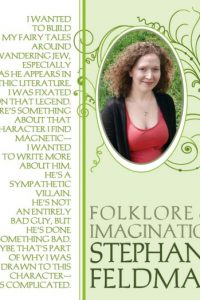Nicola Griffith: Past Present

Nicola Jane Griffith was born September 30, 1960 in Leeds, Yorkshire, England. She went to college to study science but dropped out after a few months and moved to Hull, where she played in a band. She has also worked as a women’s self-defense instructor, and teaches writing. She attended Clarion in 1988, where she met fellow writer Kelley Eskridge. They were married in 1993, though the marriage wasn’t legally recognized at the time due to laws against same-sex unions. They were legally married in 2013, on the 20th anniversary of their original ceremony.
Griffith’s first story of SF interest was “An Other Winter’s Tale” in Network (1987), followed by “Mirrors and Burnstone” in Interzone (1988). Other notable stories include BSFA Award finalist and Tiptree Honor story “Touching Fire” (1993), Nebula Award nominee “Yaguara” (1995), and Hugo Award and Locus Award finalist “It Takes Two” (2009). Three of her stories were collected in With Her Body (2004).
Griffith’s debut novel Ammonite (1993) won the James Tiptree Jr. Memorial Award and a Lambda Literary Award, and was a finalist for the Arthur C. Clarke and British SF Association Awards. Slow River (1995) won a Nebula Award and another Lambda Award. Literary crime novel The Blue Place (1998) began the Aud Torvingen series, which continued in Stay (2002) and Always (2007), all of which won awards. Hild (2013) is a historical novel about Saint Hilda of Whitby, and was a Tiptree Honor Book and a finalist for the Nebula Award, John W. Campbell Memorial, Lambda Literary, and Bisexual Book Awards, and won a Washington State Book Award, among other honors. A sequel, Menewood, is forthcoming. So Lucky (2018) also won a Washington State Book Award. Griffith’s latest book is Spear, a queer, feminist Arthurian story.
Griffith wrote a memoir, And Now We Are Going to Have a Party: Liner Notes to a Writer’s Early Life (2007), another Lambda winner, and edited three award-winning anthologies with Stephen Pagel: Bending the Landscape: Fantasy (1997), Bending the Landscape: Science Fiction (1998), and Bending the Landscape: Horror (2001).
Griffith and Eskridge live in Seattle WA.
Excerpt from the interview:
“In my first book, Ammonite, I really wanted to know why so many people seemed to not think women were human. We were always lesser – we were always the afterthought. I decided the only way to really examine that question was to think about a world of women. What would women be like as people, as opposed to women-people? That story had to be science fiction, because there’s no way you could remove all men and have it be labelled as anything else. It couldn’t be noir, for instance. It could be noir-science fiction, I suppose, but then it’s automatically fantastika. To me, they’re just labels; it’s all story. To me, genre is just the vehicle you choose to cross the story terrain.
“When I wrote Ammonite, I had just been to Clarion, so I was in science fiction mode. But I read everything, and I only started writing science fiction because that was the group I found myself in, and it was the way my brain worked at the time. I loved science and I loved arts. If you really look at Ammonite, it’s a planetary romance; it’s about exploring the world, falling in love with it through exploration. In that sense, it’s like Hild. I wrote Hild to explore the world of the seventh century – to go back in time and see what the north of England was like. I love to explore, and I’m not the only one. That’s why so many SF books are essentially planetary romances – writers like to play. We like to get out and see. We’re stuck in our tiny apartment, or at home in the pandemic, and it’s a marvelous escape to go out and see the world.
“I’d been to Wales, and so when it was time to write Spear I was like, ‘Okay, let’s just take away all the stuff I don’t like: the contrails, and the car exhaust, and people on their phones in the quiet place. Just get rid of that. Now it’s the sixth century.’ And though I would miss electricity and running water, it would be peaceful. And right now, I miss peace. It’s the thing I miss most on earth. Peace and quiet.
“I was a nature kid to the degree that I could be. We lived in the city, in Leeds – but we would go for walks. One of the houses we lived in was on the edge of a golf course, so it had this big rough around it – trees and gorse bushes – so I would spend my entire day running around and climbing trees. It was really civilized; it was not the wild, but to a small person it felt like the wild. I would have to come home occasionally so Mum could make sure I was not bleeding to death. The rest of the time, though, I was free to run around and build my own weapons. I made bows and arrows and spears, slingshots and catapults – I practiced warfare, basically. A lot of kids lived on our street and a lot on another, and basically we formed these gangs and I would supply the weapons. (I don’t know how I learned about weapons, but when you think about it the physics are pretty obvious.)
“Some of my earliest memories of fiction are Rosemary Sutcliff’s books – I was maybe about eight when I discovered her work. Our local library operated on the principle that if you could reach it on the shelf, you were probably old enough to read it. Rosemary Sutcliff mostly wrote children’s historical fiction, but she occasionally wrote adult historical fiction, so I first read Sword at Sunset when I was nine. That’s a fully adult novel about King Arthur. So I’ve been reading this stuff my whole life, though I never thought I would write an Arthur story.
“Here’s how Spear happened. When I was researching Menewood, the sequel to Hild, Jenn Northington & Swapna Krishna were putting together this anthology of gender-bent and race-bent queer retellings of Arthurian fiction called Sword Stone Table. They asked me to contribute and I said, ‘No.’ The Matter of Britain is such a national origin story that it’s steeped in this whole notion of Manifest Destiny and white supremacy – and, especially in the last few years, so-called ‘Anglo-Saxon’ culture has been coopted and adopted by white supremacists. I did not want to touch that with a barge pole. But at the same time, as part of the research I was doing for Menewood, I was looking at the etymology of various words, phrases, and place names and trying to figure out Primitive Welsh (before it became Old Welsh) – trying to recreate the earlier names of certain places. Part of the research I was doing concerned three battles that have never really made sense. One of the biggest regime changes in Northern England happened around 634, and it makes no sense on paper. If you read the only few bits that are written down in the Anglo-Saxon Chronicles, it makes no sense at all. You’ve got this king, Cadwallon (though he might not have been a king at the time) with a massive warband. He’s been triumphant for over a year, slaughtering and murdering all who oppose him, accumulating gold and other spoils, and then along comes this other claimant, with at most 200 in his warband, and he wins. It makes no sense. It makes even less sense when you understand that Cadwallon – with the big, rich, winning warband – is safely barracked in a fortified town – yet they come out to face the smaller warband (why?) and then lose. It makes zero sense. I had to do a lot of thinking to figure it out – and, more importantly, how Hild could have had a hand in it.
“I had to work out the terrain of all sorts of places, which meant I had to build maps. When I build maps, I want to label things, but I didn’t want to label them with current terminologies, so I had to go way back in time and look at what we know about those place names. Then I started getting lost in philology. There’s this philologist called Andrew Breeze at the University of Navarre, and he loves just the same kind of things I do. He wrote this article about Arthur, and I was following philological trails, and then Swapna and Jenn asked me to be in this anthology and I said, ‘No.’
“I was reading Breeze’s article about Arthur and whether or not he was actually a warlord in Northern Britain in 537 – a year with a lot of volcanic activity. In the Northern hemisphere – China, Russia, Europe, everywhere – there was no summer for two years. Lots of people starved. It’s around this time that the plague of Justinian starts. Anyway, Breeze’s idea was that Arthur was basically this Northern chieftain who became famous because he kept his people alive by stealing all his neighbors’ cattle. That was it – that was Arthur: cattle thief. I don’t wholly buy it, but it’s an interesting idea.
“So all this stuff was fermenting in my head, and I kept writing Menewood, and then Jenn and Swapna sent me another email saying, ‘Pretty please, will you write this story?’ I was about to type ‘Nope’ when an image dropped into my head: this bony horse, and a tall woman with tatty armor and a red spear, and I thought, ‘Well… that’s interesting… hmm…’ and all these little ideas started sticking to that image.
“So I said, ‘Actually, I think I have an idea. I think it may be a little bit longer, about 12k words. Is that beyond your guidelines?’ They said ‘No, a lot of people are coming in short, so that would be perfect.’ I said, ‘Great!’ and then I because the story wasn’t due for a while I went back to Menewood. And completely forgot about the story.
“I was working away on Menewood and having a great time, and then I got another email from poor Jenn saying, ‘Hi, so your story is due tomorrow…’ I said, ‘Can you extend it for two weeks? I will get it to you then.’ I put Menewood aside and started what I thought was a short story. It was about a girl who lives in a cave who finds some broken armor, and then I thought, ‘Oh, this is the Percival story.’ Then the red spear made sense: the Red Knight! I had no idea where the story was going… but, in that weird writing way I also did know. Because of the etymology, I knew it was going to be Peretur – the earliest version of Percival – because of the red, but also because of the philology. Peretur’s name was key. Through her name I figured out how to bring in not just Welsh history and British legend, but Irish myth. I could take the magical objects of the Tuatha Dé – the sword, the stone, the cauldron, and the spear – and map those onto Arthurian myth. The first three, of course, map easily – Excalibur, the stone Excalibur is pulled from, and the Grail – but the spear? Not so much. But all that etymology now paid off because Peretur’s name could come from two old Welsh words, bêr, meaning hard, and hyddur, meaning spear: Peretur herself could be the spear! It all just came together in a big explosion in my head, and I was off. The words just roared out.
“I hit 10k words in 3 days and thought, ‘This is not what I expected,’ but I just went with it. It just didn’t stop – it came out in one long rush. No chapter breaks. I got to the end and thought, ‘Holy shit.’ It took just 17 days to do that first draft of 40-something thousand words. So I wrote to the editors and said, ‘I’m really sorry – here’s your money back.’ So now I have Spear: longer than a novella but shorter than a novel. And sort-of Arthuriana and sort-of not.
“I’ve already had comments about it on social media where people said, ‘I was reading this and I loved it and I was two-thirds of the way through before I realized it was an Arthur book…. Otherwise, I wouldn’t have picked it up because I hate that shit!’ And I kind-of know what they mean. But, well, there it is.
Interview design by Francesca Myman.
This report and more like it in the June 2022 issue of Locus.
 While you are here, please take a moment to support Locus with a one-time or recurring donation. We rely on reader donations to keep the magazine and site going, and would like to keep the site paywall free, but WE NEED YOUR FINANCIAL SUPPORT to continue quality coverage of the science fiction and fantasy field.
While you are here, please take a moment to support Locus with a one-time or recurring donation. We rely on reader donations to keep the magazine and site going, and would like to keep the site paywall free, but WE NEED YOUR FINANCIAL SUPPORT to continue quality coverage of the science fiction and fantasy field.
©Locus Magazine. Copyrighted material may not be republished without permission of LSFF.








